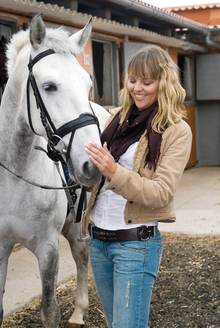You know your horse better than anyone. When he begins not acting like himself and showing clinical signs of illness, you fear he’s been exposed to disease. Normally, within 24 to 48 hours of exposure, infected horses begin to demonstrate coughing, fever, depression and decreased feed intake.

Keeping your horse healthy
For the best disease protection, work proactively alongside your veterinarian to vaccinate your horse annually against the five core equine diseases.
What should you do if your horse was exposed to disease?
No. 1: Immediately isolate the horse. If you have concerns your horse was exposed to disease, isolate him immediately from all other horses and implement biosecurity management practices, as outlined by the American Association of Equine Practitioners.
No. 2: Call your veterinarian. Involve your veterinarian as soon as possible to help limit disease progression and time out of the saddle.
No. 3: Determine the disease. Work with your veterinarian to implement diagnostic testing, which involves a wide range of screening tests to quickly diagnose disease, allowing rapid treatment for your horse.
No. 4: Keep a close watch on your horse. Isolate him for at least two weeks — no less than three weeks if diagnosed with strangles. With strangles, your horse may require diagnostics and nasal swabs to ensure he’s clear of Streptococcus equi bacteria before exposure or turnout with other horses. In any case, take your horse’s temperature twice daily and closely monitor his feed and water intake.
No. 5: Help protect against future disease risks. Work with your veterinarian to develop a comprehensive vaccination program for your horse. For a broad portfolio of core and risk-based equine vaccines you can rely on, look to Zoetis. West Nile-Innovator® and Fluvac Innovator® are the veterinarian and horse owner’s first choice for West Nile and equine influenza protection.1
For the best disease protection, work proactively alongside your veterinarian to vaccinate your horse annually against the five core equine diseases: Eastern and Western equine encephalomyelitis, rabies, tetanus and West Nile.
Consider your horse’s lifestyle and discuss with your veterinarian if he may benefit from risk-based vaccinations to help protect against diseases such as equine influenza, equine herpesvirus or strangles.
For peace of mind, West Nile-Innovator and Fluvac Innovatorvaccines from Zoetis are covered under the Equine Immunization Support Guarantee. Learn more about the most comprehensive equine vaccine guarantee available.
Article by Dr. Kevin Hankins, DVM, MBA, senior technical services veterinarian, Zoetis
About Zoetis
Zoetis is the leading animal health company, dedicated to supporting its customers and their businesses. Building on more than 60 years of experience in animal health, Zoetis discovers, develops, manufactures and markets veterinary vaccines and medicines, complemented by diagnostic products, genetic tests, biodevices and a range of services.
Zoetis serves veterinarians, livestock producers and people who raise and care for farm and companion animals with sales of its products in more than 100 countries. In 2016, the company generated annual revenue of $4.9 billion with approximately 9,000 employees. For more information, visit www.zoetisUS.com.
1Data on file, MDI sales data for WEST NILE-INNOVATOR and FLUVAC INNOVATOR as of 12/31/16, Zoetis Inc.
Press release by ZOETIS
